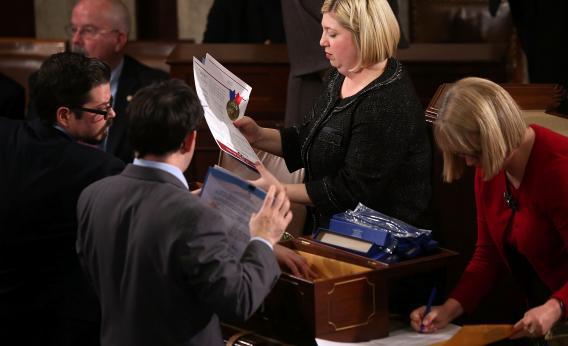These guys are swiftly becoming my favorite state legislative body. From the AP:
Virginia’s Republican-ruled legislature has taken the first steps toward ending the state’s winner-takes-all system of apportioning its 13 presidential electoral votes. A Senate subcommittee recommended Sen. Bill Carrico’s bill on Wednesday on a 3-3 party line vote.
I interviewed Carrico about the bill last month, asking why he added a provision that makes this even less democratic than other vote-split schemes. Most of these bills assign one electoral vote for every congressional district, then give the two at-large districts to whoever wins the state. But the Carrico bill would assign the final two electors to whoever won the most districts.
“We’re still not sure we’re going to leave it at that,” he told me. “If we tweak the legislation somewhat to allow those votes to the statewide winner, the metropolitan voters may understand that their vote is going to be heard.”
Not quite. The new language:
Receipt by a slate of electors of the highest number of votes in a majority of congressional districts constitutes the election of the two at-large electors of that slate.
Look at the map from 2012. Mitt Romney won the 1st (53%), 4th (50%), 5th (53%), 6th (59%), 7th (57%), 9th (63%), and 10th (50%) districts. Barack Obama won the four remaining districts – the 2nd (50%), 3rd (79%), 8th (68%), and 11th (62%). Had the Carrico plan been in place in 2012, Romney would have won nine of Virginia’s electoral votes, and Obama would have won four – even though Obama won the popular vote of the state by nearly 150,000 ballots and four percentage points.
It gets worse. You’ll notice that the 2nd, 4th, and 10th districts were squeakers, with margins between 4,000 and 5,000 votes. Carrico’s theory is that an electoral vote split would make rural areas more vital. But these districts cover the Tidewater region and the exurbs of Washington, D.C. One: Had Obama campaigned to win them, in particular, he wouldn’t have necessarily focused on anything that didn’t work statewide. Two: Had he won them, he would have taken eight electors to Mitt Romney’s five. Winning Virginia wouldn’t have been worth 13 votes. It’d have been like taking New Hampshire or Rhode Island. That’s because this reform is designed to disenfranchise Democrats, not make the state more important.
